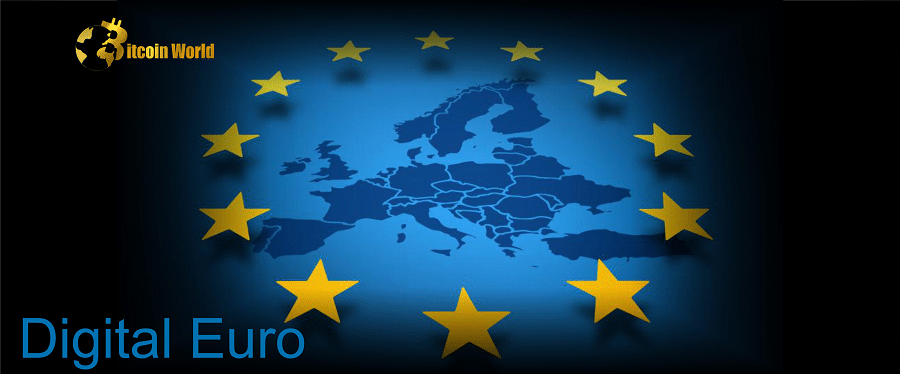The digital euro continues to be a hot topic in the financial world, and recent developments from the Eurogroup underscore its importance. Finance ministers from the eurozone have once again voiced their support for the research into a digital euro, signaling that this project remains a priority. However, this endorsement comes with a significant caveat: the design and implementation of a digital euro will require substantial political decisions.
What’s the Latest from the Eurogroup on the Digital Euro?
In a recent meeting held in Brussels, the Eurogroup, comprising finance ministers from the countries using the euro, released a statement reaffirming their commitment to exploring a digital euro. This isn’t just a casual nod; it’s a structured, ongoing dialogue. The Eurogroup has established regular meetings specifically to delve into the political dimensions of this potential digital currency. This announcement, dated January 16th, aligns with the European Central Bank (ECB) releasing a comprehensive “stock taking” paper. This paper essentially outlines the current status and progress of the digital euro’s design phase.
For those following the digital currency space, this news highlights a crucial aspect: the technical feasibility is only one part of the equation. The Eurogroup’s statement emphasizes that the core choices about how a digital euro will function and be used are inherently political.
To put it plainly, the Eurogroup stated:
“The Eurogroup considers that the introduction of a digital euro as well as its main features and design choices requires political decisions that should be discussed and taken at the political level.”
This isn’t just about technology; it’s about policy, governance, and the future of finance within the Eurozone.
What Political Aspects Are Under Consideration?
The Eurogroup isn’t just vaguely mentioning “political decisions.” They’ve identified key areas that demand careful consideration. These include:
- Environmental Impact: In an increasingly eco-conscious world, the environmental footprint of a digital currency is a significant concern. The Eurogroup is examining the energy consumption and sustainability aspects of the digital euro.
- Privacy: Digital currencies inherently raise privacy questions. How will user data be protected? What level of anonymity will be afforded? These are critical political and societal questions that need to be addressed.
- Financial Stability: Introducing a digital euro could have profound implications for the existing financial system. The Eurogroup is assessing potential risks and ensuring that the digital euro contributes to, rather than destabilizes, financial stability.
- Wider EU Implications: The Eurogroup is also interested in the central bank digital currency (CBDC) plans of EU member states outside the eurozone. This suggests a desire for a coordinated approach within the broader European Union, even beyond the euro area.
These points underscore that the digital euro is not just a technological upgrade to existing payment systems. It’s a potential reshaping of the financial landscape, requiring careful political navigation.
What’s Next on the Horizon for the Digital Euro?
The Eurogroup’s statement also provides a glimpse into the timeline and next steps. They are actively engaging with both the European Central Bank and the European Commission, emphasizing the need for continuous updates and collaboration. The finance ministers have expressed their readiness to be actively involved in these discussions, signaling a proactive approach to shaping the digital euro.
Adding to this forward momentum, the Eurogroup highlighted:
“We also welcome the [European] Commission’s intention to table in the first half of 2023 a legislative proposal that would establish the digital euro and regulate its main features, subject to the decision of the co-legislators.”
This legislative proposal is a crucial step. It will formally outline the legal framework for the digital euro, defining its key characteristics and regulatory boundaries. However, it’s important to note that this proposal is subject to the approval of the EU’s co-legislators (typically the European Parliament and the Council of the European Union), highlighting the democratic and political process involved.
The timeline suggests that the ECB Governing Council will review the findings of the digital currency investigation phase in the third quarter of this year. The legislative proposal from the Commission is expected to be presented before this review, setting the stage for informed discussions and decisions.
Skepticism Remains: Is the Digital Euro Worth It?
While the Eurogroup and ECB are moving forward with digital euro research, not everyone is convinced of its necessity or benefits. Interestingly, just a day before the Eurogroup’s declaration, a former advisor to the Bank of England penned an article in the Financial Times questioning the value proposition of CBDCs. The argument presented was that the costs and potential risks associated with building CBDCs might outweigh the advantages.
This skepticism serves as a reminder that the digital euro is not without its critics and challenges. The Eurogroup’s emphasis on political decisions acknowledges the complexity and the need to address concerns regarding cost, risk, and overall societal benefit.
The Digital Euro: A Politically Charged Path Forward
In conclusion, the Eurogroup’s latest statement reinforces the ongoing commitment to exploring a digital euro. However, it also firmly places the project within a political context. The key takeaway is that while the technical groundwork is being laid, the ultimate shape and success of the digital euro will depend heavily on political choices. Factors like privacy, environmental impact, and financial stability are not just technical considerations; they are fundamental policy decisions that will shape the future of digital finance in the Eurozone. As the digital euro journey progresses, the interplay between technology and political will be the defining factor.
Disclaimer: The information provided is not trading advice, Bitcoinworld.co.in holds no liability for any investments made based on the information provided on this page. We strongly recommend independent research and/or consultation with a qualified professional before making any investment decisions.


